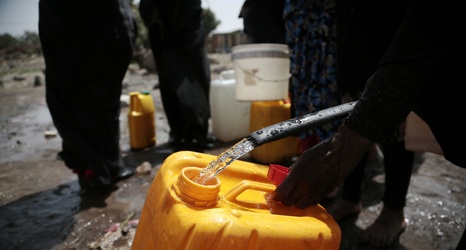Sanaa, Yemen • Collapsing on sidewalks and constantly vomiting, some of the Yemeni villagers barely make it to the tiny health center where doctors spread carton sheets in the backyard and use trees to hang bags of IV fluids for patients.
They are part of a stream of hundreds of suspected cholera victims that continues to converge on the center from the impoverished town of Bani Haydan in Yemen’s northern Hajja province. Just hours after being infected, vomiting and diarrhea cause severe dehydration that can kill without rapid intervention.
Yemen’s raging two-year conflict has turned the country into an incubator for lethal cholera: Primitive sanitation and water systems put Yemenis at risk of drinking feces-contaminated water; wells are dirtied by runoff from rainfall on piles of garbage left uncollected for weeks; farmland is irrigated with broken sewers due to lax oversight and corruption; medical intervention is delayed due to unpaid government employees and half of the country’s health facilities are out of service.
